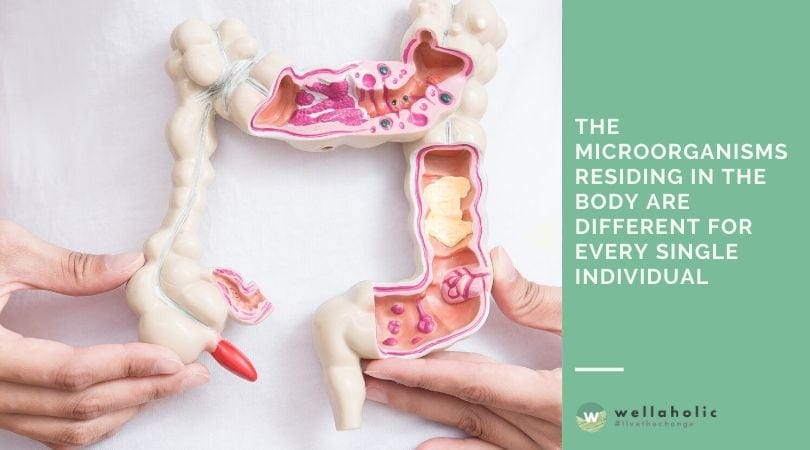
The Importance of Gut Health
TL:DR Summary
- Gut Microbiota’s Role: Affects your entire body, from mood to metabolism.
- Diet’s Impact: What you eat significantly changes your gut microbiome.
- Signs of Imbalance: Upset stomach, skin issues, mood swings signal problems.
- Healing Your Gut: Diet changes, probiotics, and supplements can improve health.
- Probiotic Benefits: Wellaholic’s complex supports digestive health, immunity.
- Personalized Care: Unique microbiome requires tailored solutions for optimal health.
Introduction
In my journey through the aesthetics landscape, I’ve encountered an often overlooked aspect of beauty and wellness: gut health. As the Aesthetic Director at Wellaholic, my conversations with customers and continuous learning from industry experts have highlighted how our gut’s well-being significantly affects our skin and overall health.
Gut health is not just about avoiding stomach aches; it’s a cornerstone of a radiant complexion and vitality.
In the following article, I’ll dive into the why’s and how’s of maintaining a healthy gut and its profound impact on our aesthetic and health goals. Join me as we explore the crucial role of gut health, backed by my experiences and the latest research in the field.
What is Gut Microbiota Research and How is it used?
As an Aesthetic Director with over a decade of experience, I’ve seen firsthand how gut health impacts our overall well-being, including our skin. Did you know that we have as many microbes in our gut as cells in our entire body? It’s truly fascinating!
Our gut is home to trillions of microorganisms, including bacteria, fungi, and viruses. What’s interesting is that only 10-20% of these microbes are shared between individuals. This means that our gut microbiome is highly personalized and plays a crucial role in supporting our unique bodily functions rather than just fighting external threats and illnesses.
Through my interactions with clients at Wellaholic, I’ve observed that each person’s gut microbiome composition varies based on their diet and lifestyle choices. These differences in microbial balance can significantly influence an individual’s appetite, weight management, and even their mood. That’s why I always emphasize the importance of maintaining a healthy gut through proper nutrition and self-care practices to achieve optimal wellness inside and out.

Diet: You are what you consume
As an Aesthetic Director with over a decade of experience, I’ve seen firsthand how our diets impact our overall well-being, especially our gut health. It’s incredible to think that the expression “you are what you eat” holds more truth than we initially believed. Recent studies have shown that our gut microbiome can change rapidly in response to our dietary choices.
I find it fascinating that a group of scientists observed a significant change in the gut microbiota, metabolic pathways, and gene expression when subjects switched from a low-fat, healthy diet to a “Western” high-fat, high-sugar diet. It’s alarming to know that a single day of consuming a high-fat, high-sugar diet can alter the gut microbiome entirely. This information has been invaluable when discussing the importance of a balanced diet with my clients.
While researchers can’t definitively say which gut microbiome composition is ideal, as it varies from person to person, they suggest that those who follow a healthier, plant-based diet are more likely to have healthier gut biomes. In my experience, clients who prioritize a nutrient-rich, plant-focused diet tend to have better overall skin health and a more radiant complexion. As research continues to uncover the intricate connections between our gut health and various aspects of our well-being, I remain committed to staying informed and sharing this knowledge with my clients to help them make the best choices for their unique needs.

Gut microbiome research: Signs & Symptoms
An upset stomach with repeated feelings of bloating, heartburn or gas could be directly related to the gut biome and the difficulties that the gut is having processing the food. Other signs are seen in unintentional weight fluctuations and sleep problems.
Insomnia, poor sleep and constant fatigue can be related to gut issues. The body’s supply of serotonin is produced in the gut, and serotonin not only affects mood but also sleep. This means that gut damage or issues could be affecting your mood and sleep as well!
Finally, gut microbiome research has shown that an increase in skin conditions like eczema could be due to gut health! Gut health plays a role in constant inflammation in the body. This inflammation can even lead to additional autoimmune issues, if left unresolved.
Not all is lost though! If you can lower stress levels and get enough sleep you are already on your way to repairing any gut issues you may have!
How do you fix it?
The evidence is available to show that the gut is highly responsive to change, both good and bad. More fruit gives rise to different microorganisms than high sugar foods do.
The gut will only work as well as the foods it is given, but other things help to make this process easier. There are even supplements that help with digestion. These supplements can help the gut in different ways.
Probiotics can be introduced to help with the digestive process. Digestive enzymes can be taken if the body is lagging behind in its’ natural production of enzymes also.
Along with probiotics and digestive enzymes, peppermint oil, Pepin and other nutritional supplements may also be used to get your gut operating at it’s most effective.
Wellaholic’s Probiotic complex

WELLAHOLIC’S PROBIOTIC COMPLEX HEALS AND PROTECTS YOUR GUT, WITH A COMBINATION OF SEVEN KEY PROBIOTICS. THEY PROTECT AND MAINTAIN YOUR DIGESTIVE TRACT TO PROMOTE A HEALTHY IMMUNE SYSTEM
Colorectal cancer is the NUMBER ONE cancer in Singapore. Gut bacteria play a crucial role in the development of colorectal cancer. Colon cancer, Rectal cancer or Bowel cancer are now understood to be linked to microbial problems in the gut. It was further suggested that taking certain probiotics containing beneficial bacteria can lower DNA damage and reduce rates of colorectal cancer.
Suggested Use: One capsule taken 1 to 3 times daily preferably with meals.

Serene Chiam, Aesthetic Director
Serene Chiam is the Aesthetic Director at Wellaholic, a well-known aesthetic chain in Singapore. She has more than ten years of experience in the aesthetics industry. With a Bachelor of Health Science (Aesthetics) and CIDESCO certifications, she expertly combines scientific knowledge with practical skills. Serene is known for her personalized approach to beauty, ensuring each Wellaholic client’s journey is unique and transformative. Her significant contributions have been pivotal in establishing Wellaholic’s reputation for excellence in aesthetic wellness.
Contact Serene at [email protected]
Wellaholic – Our Vision and Brand Promise

Wellaholic Vision and Brand Promise
At Wellaholic, we have a clear vision and brand promise that drives our dedication to helping customers look their best and achieve their aesthetic goals. We strive to provide exceptional service, foster a positive community, and empower our customers to prioritize self-care and embrace a healthier, happier lifestyle.
Wellaholic – Our Value Proposition
1. Affordable Prices. Always

- ⭐ Economical Excellence. Wellaholic maintains affordability through low costs, offering unlimited pricing packages to customers.
- ⭐ Smart Locations. Wellaholic places outlets near city MRT stations, avoiding high rents and passing savings to customers.
- ⭐ Competitive Insight. Through periodic surveys, Wellaholic ensures its prices remain affordable and competitive.
2. Highly Trained Staff

- ⭐ Commitment to Quality. Wellaholic continually trains staff, ensuring consistent, high-level service.
- ⭐ Expert Team. Wellaholic’s friendly staff boasts extensive skills and experience, including CIDESCO and WSQ qualifications.
- ⭐ Inclusive Excellence. Regular training audits at Wellaholic ensure consistent, high-quality treatments for all skin types.
3. Easy Online Booking

- ⭐ Efficient Scheduling. Wellaholic’s advanced booking system enables real-time tracking of customer appointments.
- ⭐ No-Wait Convenience. Wellaholic’s efficient booking system offers 24/7 access to schedule your preferred slot.
- ⭐ Easy Customization. Choose outlet, consultant, and service with a few clicks for personalized Wellaholic experience.
4. Multiple Convenience Locations

- ⭐ Convenient Expansion. Wellaholic will keep opening outlets in strategic locations, catering to customer convenience.
- ⭐ Accessible Proximity. Wellaholic outlets are within a 5-minute walk from multiple MRT lines for easy accessibility.
- ⭐ Expanded Capacity. Wellaholic’s ongoing expansion guarantees ample availability to meet customer demands effectively.
5. We are Open Everyday

- ⭐ Convenient Hours. Wellaholic operates from 11AM to 10PM on weekdays and 11AM to 8PM on weekends and holidays.
- ⭐ After-Work Flexibility. Wellaholic acknowledges the need for treatments after work, accommodating customer schedules accordingly.
- ⭐ Weekend Availability. Wellaholic understands customers’ weekend constraints and strives to open almost every day to accommodate them.
Reason 1: Wellaholic’s Unlimited Plans Save You Money
- ✅ Unlimited Hair Removal. Wellaholic offers unlimited hair removal plans with unlimited shots.
- ✅ Pay One Price for All Body Parts. Customers pay one price for unlimited hair removal on all body parts.
- ✅ Huge Cost Savings. Huge cost savings with unlimited plan. No separate fees for different body parts.

Reason 2: Wellaholic Has Over 50 Awards and 2000 Genuine Customer Reviews
- ✅ Over 50 Awards. Wellaholic’s treatments have been recognized by top beauty publications such as Daily Vanity, Beauty Insider
- ✅ Over 2000 Verified Customer Reviews. Wellaholic has over 2000 positive reviews from customers around the world.
- ✅ Over 50% Repeat Customers. More than 50% of Wellaholic’s customers are repeat and recurring customers.

Reason 3: It’s Easy to Book an Appointment at Wellaholic
- ✅ Open 361 Days Per Year. Wellaholic’s 8 outlets are open 361 days a year, including public holidays for easy bookings.
- ✅ No Queues. Book appointments in advance to avoid long wait times.
- ✅ Easy Online Booking. Customers can conveniently book and reschedule appointments online.
- ✅ No Extra Cost for Choosing Consultant. Customers can choose their preferred consultant for free.





